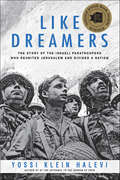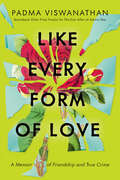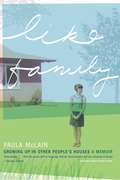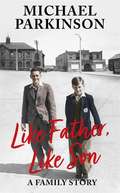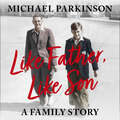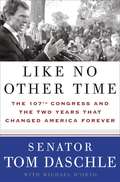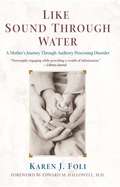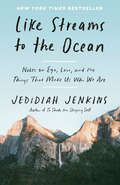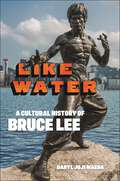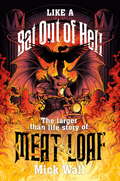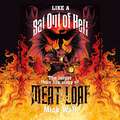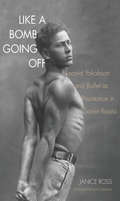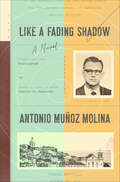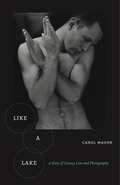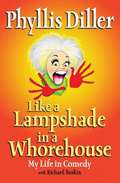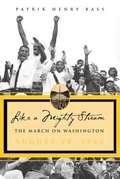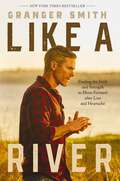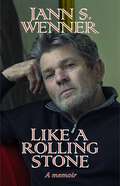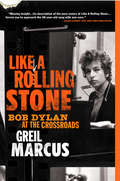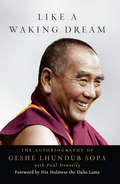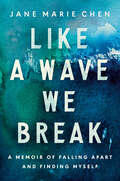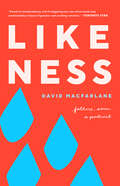- Table View
- List View
Like Dreamers: The Story of the Israeli Paratroopers Who Reunited Jerusalem and Divided a Nation
by Yossi Klein Halevi“Powerful. . . . beautifully written . . . . There is much to admire . . . especially Mr. Halevi’s skill at getting inside the hearts and minds of these seven men” —Ethan Bronner, New York TimesFollowing the lives of seven young members from the 55th Paratroopers Reserve Brigade, the unit responsible for restoring Jewish sovereignty to Jerusalem during the 1967 Six Day War, acclaimed journalist Yossi Klein Halevi reveals how this band of brothers played pivotal roles in shaping Israel’s destiny long after their historic victory. While they worked together to reunite their country in 1967, these men harbored drastically different visions for Israel’s future.One emerges at the forefront of the religious settlement movement, while another is instrumental in the 2005 unilateral withdrawal from Gaza. One becomes a driving force in the growth of Israel’s capitalist economy, while another ardently defends the socialist kibbutzim. One is a leading peace activist, while another helps create an anti-Zionist terror underground in Damascus.Featuring eight pages of black-and-white photos and maps, Like Dreamers is a nuanced, in-depth look at these diverse men and the conflicting beliefs that have helped to define modern Israel and the Middle East.“A beautifully written and sometimes heartbreaking account of these men, their families, and their nation.” —Booklist, starred review“Halevi's book is executed with imagination, narrative drive, and, above all, deep empathy for a wide variety of Israelis, and the result is a must-read for anyone with an interest in contemporary Israel and the Israeli-Palestinian conflict. —Publishers Weekly, starred review“Mr. Halevi’s masterly book brings us into [the] . . . debate and the lives of those who live it.” —Elliott Abrams, Wall Street Journal
Like Every Form of Love: A Memoir of Friendship and True Crime
by Padma ViswanathanFrom the Scotiabank Giller Prize finalist, a gripping exploration of class, race, friendship, sexuality, what an author owes her subject and what it means to be a good person—all wrapped up in a riveting Canadian true crime story.Padma Viswanathan was staying on a houseboat on Vancouver Island when she struck up a friendship with a warm-hearted, working-class queer man named Phillip. Their lives were so different it seemed unlikely to Padma that their relationship would last after she returned to her usual life. But, that week, Phillip told her a story from his childhood that kept them connected for more than twenty years.Phillip was the son of a severe, abusive man named Harvey, a miner, farmer and communist. After Phillip&’s mother left the family, Harvey advertised for a housekeeper-with-benefits. And so Del, the most glamorous and loving of stepmothers, stepped into Phillip's life. Del had hung out with Fidel Castro and Che Guevara in Mexico City before the Cuban revolution; she was also a convicted bank robber who had violated her parole and was suspected in her ex-husband&’s murder. Phillip had long since lost track of Del, but when Padma said she&’d like to write about her and about his own young life, he eagerly agreed. Quickly, though, Padma&’s research uncovered hidden truths about these larger-than-real-life characters. Watching the effects on Phillip as these secrets, evasions and traumas came to light, she increasingly feared that when it came to the book or the friendship, only one of them would get out of this process alive. In this unforgettable memoir, Padma reflects on the joys and frictions of this strange journey with grace, humour and poetry, including original readings of Hans Christian Andersen fairytales and other stories that beautifully echo her characters&’ adventures and her own. Like Every Form of Love is that rare thing: an irresistible literary page-turner that twists and turns, delivering powerful revelations, right to the very end.
Like Family: Growing up in Other People's Houses
by Paula MclainIn the tradition of Jo Ann Beard's Boys of My Youth, and Mary Karr's The Liar's Club, Paula McLain has written a powerful and haunting memoir about the years she and her two sisters spent as foster children. In the early 70s, after being abandoned by both parents, the girls were made wards of the Fresno County, California court and spent the next 14 years-in a series of adoptive homes. The dislocations, confusions, and odd pleasures of an unrooted life form the basis of one of the freshest memoirs to be published in recent years. McLain's beautiful writing and limber voice capture the intense loneliness, sadness, and determination of a young girl both on her own and responsible, with her siblings, for staying together as a family.
Like Father, Like Son: A family story
by Michael Parkinson'a quietly impressive book, which does something most celebrity autobiographies shy away from: it seeks the truth and, more often than not, finds it.' - THE MAILA look at the life and times of the man Sir Michael most looked up to.It started in the shadow of the pithead in a South Yorkshire mining village and ended up in tears before an audience of millions. Michael Parkinson's relationship with his late father John William was, and remains, a family love story overflowing with tenderness and tall tales of sporting valour, usually involving Yorkshire cricket or Barnsley FC. However, it was the overwhelming grief which poured out of Michael when Piers Morgan pressed him about John William in a television interview - four decades after the death of the father he encapsulated as 'Yorkshireman, miner, humorist and fast bowler' - that convinced one of the outstanding broadcasters and journalists of our time to delve deeper into the dynamics of their lives together. Co-written with his son Mike, this affectionate and revealing memoir explores the influences which shaped John William, Michael and succeeding generations of Parkinsons. The journey leads them from the depths of a Yorkshire coal mine, via the chapel, pub and picture-house, to a spot behind the bowler's arm at Lord's and the sands at Scarborough. While Like Father, Like Son conveys a powerful sense of time and place, it is wit, insight and, above all, enduring love which shine through its pages.
Like Father, Like Son: A family story
by Michael Parkinson'a quietly impressive book, which does something most celebrity autobiographies shy away from: it seeks the truth and, more often than not, finds it.' - THE MAILA look at the life and times of the man Sir Michael most looked up to.It started in the shadow of the pithead in a South Yorkshire mining village and ended up in tears before an audience of millions. Michael Parkinson's relationship with his late father John William was, and remains, a family love story overflowing with tenderness and tall tales of sporting valour, usually involving Yorkshire cricket or Barnsley FC. However, it was the overwhelming grief which poured out of Michael when Piers Morgan pressed him about John William in a television interview - four decades after the death of the father he encapsulated as 'Yorkshireman, miner, humorist and fast bowler' - that convinced one of the outstanding broadcasters and journalists of our time to delve deeper into the dynamics of their lives together. Co-written with his son Mike, this affectionate and revealing memoir explores the influences which shaped John William, Michael and succeeding generations of Parkinsons. The journey leads them from the depths of a Yorkshire coal mine, via the chapel, pub and picture-house, to a spot behind the bowler's arm at Lord's and the sands at Scarborough. While Like Father, Like Son conveys a powerful sense of time and place, it is wit, insight and, above all, enduring love which shine through its pages.
Like Father, Like Son: A family story
by Michael ParkinsonA look at the life and times of the man Sir Michael most looked up to.It started in the shadow of the pithead in a South Yorkshire mining village and ended up in tears before an audience of millions. Michael Parkinson's relationship with his late father John William was, and remains, a family love story overflowing with tenderness and tall tales of sporting valour, usually involving Yorkshire cricket or Barnsley FC. However, it was the overwhelming grief which poured out of Michael when Piers Morgan pressed him about John William in a television interview - four decades after the death of the father he encapsulated as 'Yorkshireman, miner, humorist and fast bowler' - that convinced one of the outstanding broadcasters and journalists of our time to delve deeper into the dynamics of their lives together. Co-written with his son Mike, this affectionate and revealing memoir explores the influences which shaped John William, Michael and succeeding generations of Parkinsons. The journey leads them from the depths of a Yorkshire coal mine, via the chapel, pub and picture-house, to a spot behind the bowler's arm at Lord's and the sands at Scarborough. While Like Father, Like Son conveys a powerful sense of time and place, it is wit, insight and, above all, enduring love which shine through its pages.(P) 2020 Hodder & Stoughton Ltd
Like Me: Confessions of a Heartland Country Singer
by Chely WrightChely Wright, singer, songwriter, country music star, writes in this moving, telling memoir about her life and her career; about growing up in America's heartland, the youngest of three children; about barely remembering a time when she didn't know she was different. She writes about her parents, putting down roots in their twenties in the farming town of Wellsville, Kansas, Old Glory flying atop the poles on the town's manicured lawns, and being raised to believe that hard work, honesty, and determination would take her far. She writes of making up her mind at a young age to become a country music star, knowing then that her feelings and crushes on girls were "sinful" and hoping and praying that she would somehow be "fixed. " ("Dear God, please don't let me be gay. I promise not to lie. I promise not to steal. I promise to always believe in you. . . Please take it away. ") We see her, high school homecoming queen, heading out on her own at seventeen and landing a job as a featured vocalist on the Ozark Jubilee (the show that started Brenda Lee, Red Foley, and Porter Wagoner), being cast in Country Music U. S. A. , doing four live shows a day, and - after only a few months in Nashville - her dream coming true, performing on the stage of the Grand Ole Opry. . . She describes writing and singing her own songs for producers who'd discovered and recorded the likes of Reba McEntire, Shania Twain, and Toby Keith, who heard in her music something special and signed her to a record contract, releasing her first album and sending her out on the road on her first bus tour. . . She writes of sacrificing all for a shot at success that would come a couple of years later with her first hit single, "Shut Up and Driver". . . her songs (from her fourth album, Single White Female) climbing the Billboard chart for twenty-nine weeks, hitting the #1 spot. . . She writes about the friends she made along the way - Vince Gill, Brad Paisley, and others - writing songs, recording and touring together, some of the friendships developing into romantic attachments that did not end happily. . . Keeping the truth of who she was clutched deep inside, trying to ignore it in a world she longed to be a part of - and now was - a world in which country music stars had never been, could not be, openly gay. . . She writes of the very real prospect of losing everything she'd worked so hard to create. . . doing her best to have a real life - her best not good enough. . . And in the face of everything she did to keep herself afloat, she writes about how the vortex of success and hiding who she was took its toll: her life, a tangled mess she didn't see coming, didn't want to; and, finally, finding the guts to untangle herself from the image of the country music star she'd become, an image steeped in long-standing ideals and notions about who - and what - a country artist is, and what their fans expect them to be. . . "I am a songwriter," she writes. "I am a singer of my songs - and I have a story to tell. As I've traveled this path that has delivered me to where I am today, my monument of thanks, paying honor to God, remains. I will do all I can with what I have been given. . . " Like Meis fearless, inspiring, true.
Like No Other Time: The 107th Congress and the Two Years That Changed America Forever
by Tom Daschle Michael D'OrsoTom Daschle, the Majority Leader of the historic 107th Senate, presents a candid insider’s account of the workings of the U.S. government during two of the most tumultuous years in the nation’s history.The 107th Congress faced a time like no other in the life of the nation. This was the era of the first presidential election to be decided by the United States Supreme Court, the fifty-fifty Senate, the horror of September 11, the anthrax attacks on media and the government (including Daschle’s own office), the war on terrorism, corporate scandals that shook the economy, the inexorable move toward war with Iraq, and other dramatic events, all leading up to the historic midterm elections of 2002.Through it all, Senator Tom Daschle had, with the exception of the President, the most privileged view of these unfolding developments, both in front of and behind the closed doors of government. In Like No Other Time, Daschle offers a riveting account of his singular perspective on a time when the nation faced deadly and elusive external enemies and a level of domestic political contention rarely seen in American history. Senator Daschle is un-flinching in his impressions of the key political figures of our time from both parties. The result is an acutely perceptive assessment of how our government met—and sometimes did not meet—the challenges of a remarkable era.As it was during the years of the 107th Congress, the United States is once again at a critical and historic crossroads. Our choices, based on what we have learned from our recent past, will affect our future in profound ways. For Senator Daschle, the first and perhaps most important choice lies with what kind of representation and leadership we want in government. It is a choice between a political party with a core philosophical belief in the power of our collective will to confront these challenges through our government, and one dominated by a group of people who don’t like and don’t believe in government.
Like Sound Through Water: A Mother's Journey Through Auditory Processing Disorder
by Karen J. FoliA mother's account of her family's struggle with APD (Auditory Processing Disorder) in her oldest son, Ben.
Like Streams to the Ocean: Notes on Ego, Love, and the Things That Make Us Who We Are
by Jedidiah Jenkins<P><P>You can travel the world looking for yourself, but if you don't know what you're looking for, how can you find it? Like Streams To The Ocean is about examining the things that make us who we are and getting to know ourselves, our stories, and the decisions that shape our one and only life. Writing with the passion and clarity that made his debut, To Shake the Sleeping Self, a national bestseller, Jedidiah Jenkins brings together new and old writings to explore the eight subjects that give life meaning: ego, family, home, friendship, love, work, death, the soul. <P>Who am I? What am I made of? How much of how I act boils down to avoiding the things that make me feel small? As he examines the experiences that shape our conscious and subconscious answers to these questions, Jenkins leads readers in a wide-ranging conversation about finding fulfillment in the people and places around us and discovering the courage to show our deepest selves to the world. <P><P><b>A New York Times Bestseller</b>
Like Water: A Cultural History of Bruce Lee
by Daryl Joji MaedaHighlights Bruce Lee’s influence beyond martial arts and filmAn Asian and Asian American icon of unimaginable stature and influence, Bruce Lee revolutionized the martial arts by combining influences drawn from around the world. Uncommonly determined, physically gifted, and artistically brilliant, Lee rose to fame as part of a wave of transpacific globalization that bridged the nearly seven thousand miles between Hong Kong and California. Like Water unpacks Lee’s global impact, linking his legendary status as a martial artist, actor, and director to his continual traversals across the newly interconnected Asia and America.Daryl Joji Maeda’s multifaceted account of Bruce Lee’s legacy uniquely traces how movements and migrations across the Pacific Ocean structured the cultures Bruce Lee inherited, the milieu he occupied, the martial art he developed, the films he made, and the world he left behind. A unique blend of cultural history and biography, Like Water unearths the cultural strands that Lee intertwined in his rise to a new kind of global stardom. Moving from the gold rush in California and the British occupation of Hong Kong, to the Cold War and the deployment of American troops across Asia, Maeda builds depth and complexity to this larger-than-life figure. His cultural chronology of Bruce Lee reveals Lee to be both a product of his time and a harbinger of a more connected future. Nearly half a century after his tragic death, Bruce Lee remains an inspiring symbol of innovation and determination, with an enduring legacy as the first Asian American global superstar.
Like a Bat Out of Hell: The Larger than Life Story of Meat Loaf
by Mick Wall'A passionate, pacey tome you should do anything for a copy of' - Kerrang! ****"I never wanted to be a big star. I just wanted to be the biggest at what I do! Powerful, unstoppable, heavy - when that word still meant something good!" - Meat Loaf, as told to Mick Wall Everything in the story of Meat Loaf is big. From the place he was born (Texas); to the family he was born into (his father weighed 22 stone, his uncle weighed over 40 stone, while Meat Loaf himself weighed 17 stone before he was even in his teens); to the sound he made (a colossal collision between Richard Wagner, Phil Spector and Bruce Springsteen); and of course the records he sold - nearly 50 million in Britain and America alone. Now, on the eve of the 40th anniversary of Bat Out of Hell, the album that gave rise to Meat Loaf's astonishing career, and the premiere of Bat Out Of Hell: The Musical, Mick Wall, who has interviewed Meat Loaf on numerous occasions throughout his career, pulls back the curtains to reveal the soft-hearted soul behind the larger-than-life character he created for himself. From a tumultuous childhood with an alcoholic father to the relentless abusive bullying from classmates and their parents alike, nobody could have predicted Meat Loaf's meteoric rise to fame. But when the messianic rock opera Bat Out of Hell was released in 1977, it became one of the biggest albums of all time, selling over 45 million copies worldwide to date. Its release marked the start of a rollercoaster ride of incredible highs and seemingly career-ending lows. By the 80s, Meat Loaf was battling with drug and alcohol addiction and escalating money problems that would eventually lead to a nervous breakdown. But just when it seemed like it was all over, the astonishing success of Bat Out of Hell II and the mega-hit 'I'd Do Anything For Love (But I Won't Do That)' marked an extraordinary new wave of success. Now, Mick Wall will bring this extraordinary story up to date, drawing on the hours he spent with Meat Loaf, both in interviews and on tour, as well as offering up a unique insight from those who have known him best.
Like a Bat Out of Hell: The Larger than Life Story of Meat Loaf
by Mick Wall'A passionate, pacey tome you should do anything for a copy of' - Kerrang! "I never wanted to be a big star. I just wanted to be the biggest at what I do! Powerful, unstoppable, heavy - when that word still meant something good!" - Meat Loaf, as told to Mick Wall Everything in the story of Meat Loaf is big. From the place he was born (Texas); to the family he was born into (his father weighed 22 stone, his uncle weighed over 40 stone, while Meat Loaf himself weighed 17 stone before he was even in his teens); to the sound he made (a colossal collision between Richard Wagner, Phil Spector and Bruce Springsteen); and of course the records he sold - nearly 50 million in Britain and America alone.From a tumultuous childhood with an alcoholic father to the relentless abusive bullying he endured, nobody could have predicted Meat Loaf's meteoric rise to fame. But when the messianic rock opera Bat Out of Hell was released in 1977, it became one of the biggest albums of all time, selling over 45 million copies worldwide to date. Its release marked the start of a rollercoaster ride of incredible highs and seemingly career-ending lows. By the 80s, Meat Loaf was battling with drug and alcohol addiction and escalating money problems. But just when it seemed like it was all over, the astonishing success of Bat Out of Hell II and the mega-hit 'I'd Do Anything For Love (But I Won't Do That)' marked an extraordinary new wave of success. Now, Mick Wall will bring this extraordinary story up to date, drawing on the hours he spent with Meat Loaf, both in interviews and on tour, as well as offering up a unique insight from those who have known him best.
Like a Bat Out of Hell: The Larger than Life Story of Meat Loaf
by Mick Wall"I never wanted to be a big star. I just wanted to be the biggest at what I do! Powerful, unstoppable, heavy - when that word still meant something good!" - Meat Loaf, as told to Mick Wall Everything in the story of Meat Loaf is big. From the place he was born (Texas); to the family he was born into (his father weighed 22 stone, his uncle weighed over 40 stone, while Meat Loaf himself weighed 17 stone before he was even in his teens); to the sound he made (a colossal collision between Richard Wagner, Phil Spector and Bruce Springsteen); and of course the records he sold - nearly 50 million in Britain and America alone. Now, on the eve of the 40th anniversary of Bat Out of Hell, the album that gave rise to Meat Loaf's astonishing career, and the premiere of Bat Out Of Hell: The Musical, Mick Wall, who has interviewed Meat Loaf on numerous occasions throughout his career, pulls back the curtains to reveal the soft-hearted soul behind the larger-than-life character he created for himself. From a tumultuous childhood with an alcoholic father to the relentless abusive bullying from classmates and their parents alike, nobody could have predicted Meat Loaf's meteoric rise to fame. But when the messianic rock opera Bat Out of Hell was released in 1977, it became one of the biggest albums of all time, selling over 45 million copies worldwide to date. Its release marked the start of a rollercoaster ride of incredible highs and seemingly career-ending lows. By the 80s, Meat Loaf was battling with drug and alcohol addiction and escalating money problems that would eventually lead to a nervous breakdown. But just when it seemed like it was all over, the astonishing success of Bat Out of Hell II and the mega-hit 'I'd Do Anything For Love (But I Won't Do That)' marked an extraordinary new wave of success. Now, Mick Wall will bring this extraordinary story up to date, drawing on the hours he spent with Meat Loaf, both in interviews and on tour, as well as offering up a unique insight from those who have known him best.(p) Orion Publishing Group with Audible Ltd 2017
Like a Bomb Going Off
by Janice Ross Ms Lynn GarafolaEveryone has heard of George Balanchine. Few outside Russia know of Leonid Yakobson, Balanchine's contemporary, who remained in Lenin's Russia and survived censorship during the darkest days of Stalin. Like Shostakovich, Yakobson suffered for his art and yet managed to create a singular body of revolutionary dances that spoke to the Soviet condition. His work was often considered so culturally explosive that it was described as "like a bomb going off." Based on untapped archival collections of photographs, films, and writings about Yakobson's work in Moscow and St. Petersburg for the Bolshoi and Kirov ballets, as well as interviews with former dancers, family, and audience members, this illuminating and beautifully written biography brings to life a hidden history of artistic resistance in the USSR through this brave artist, who struggled against officially sanctioned anti-Semitism while offering a vista of hope.
Like a Fading Shadow: A Novel
by Antonio Muñoz MolinaA hypnotic novel intertwining the author’s past with James Earl Ray’s attempt to escape after shooting Martin Luther King Jr.The year is 1968 and James Earl Ray has just shot Martin Luther King Jr. For two months he evades authorities, driving to Canada, securing a fake passport, and flying to London, all while relishing the media’s confusion about his location and his image on the FBI’s Most Wanted list. Eventually he lands at the Hotel Portugal in Lisbon, where he anxiously awaits a visa to Angola. But the visa never comes, and for his last ten days of freedom, Ray walks around Lisbon, paying for his pleasures and rehearsing his fake identities. Using recently declassified FBI files, Antonio Muñoz Molina reconstructs Ray’s final steps through the Portuguese capital, taking us inside his feverish mind, troubled past, and infamous crime. But Lisbon is also the city that inspired Muñoz Molina’s first novel, A Winter in Lisbon, and as he returns now, thirty years later, it becomes the stage for and witness to three alternating stories: Ray in 1968 at the center of an international manhunt; a thirty-year-old Muñoz Molina in 1987 struggling to find his literary voice; and the author in the present, reflecting on his life and the form of the novel as an instrument for imagining the world through another person’s eyes. Part historical fiction, part fictional memoir, Like a Fading Shadow masterfully explores the borders between the imagined, the reported, and the experienced past in the construction of identity.
Like a Lake: A Story of Uneasy Love and Photography
by Carol MavorA vivid, imaginative response to the sensual and erotic in postwar American photography, with attention to the beauty of the nude, both male and femaleWhen photographer Coda Gray befriends a family with a special interest in a young boy, the motivation behind his special attention is difficult to grasp, “like water slipping through our fingers.” Can a man innocently love a boy who is not his own?Using fiction to reveal the truths about families, communities, art objects, love, and mourning, Like a Lake tells the story of ten-year-old Nico, who lives with his father (an Italian- American architect) and his mother (a Japanese-American sculptor who learned how to draw while interned during World War II). Set in the 1960s, this is a story of aesthetic perfection waiting to be broken. Nico’s midcentury modern house, with its Italian pottery jars along the outside and its interior lit by Japanese lanterns. The elephant-hide gray, fiberglass reinforced plastic 1951 Eames rocking chair, with metal legs and birch runners. Clam consommé with kombu, giant kelp, yuzu rind, and a little fennel—in each bowl, two clams opened like a pair of butterflies, symbols of the happy couple. Nico’s boyish delight in developing photographs under the red safety light of Coda’s “Floating Zendo”— the darkroom boat that he keeps on Lake Tahoe.The lives of Nico, his parents, and Coda embody northern California’s postwar landscape, giving way to fissures of alternative lifestyles and poetic visions. Author Carol Mavor addresses the sensuality and complexity of a son’s love for his mother and that mother’s own erotic response to it. The relationship between the mother and son is paralleled by what it means for a boy to be a model for a male photographer and to be his muse. Just as water can freeze into snow and ice, melt back into water, and steam, love takes on new forms with shifts of atmosphere. Like a Lake’s haunting images and sensations stay with the reader.
Like a Lampshade in a Whorehouse: My Life in Comedy
by Richard Buskin Phyllis DillerFrom housewife to humorist, the late-great Phyllis Diller has been making millions laugh for five decades with her groundbreaking comedy. Now the laughter continues with her uproarious autobiography. Like a Lampshade in a Whorehouse recounts how, against all odds, Phyllis Diller became America’s first successful and best-loved female stand-up comic. She began her professional career at age thirty-seven, in spite of the fact that she was a housewife and mother of five, and was working at a radio station because of her husband’s chronic unemployment. Now, fifty years later, after two traumatic marriages, extensive cosmetic surgery, numerous film, television, and stage appearances, and separate careers as an artist and piano soloist with symphony orchestras, Phyllis Diller finally tells her story. With her trademark laugh, self-deprecating humor, and incredible wit, Phyllis Diller has etched her way into comedic history. And while her wild hair and outrageous clothes may make her look like a lampshade in a whorehouse, her strength, self-belief, perseverance, and raucous sense of humor make her truly unforgettable. .
Like a Mighty Stream: The March on Washington, August 28, 1963
by Patrik Henry BassThe March on Washington for Jobs and Freedom, held in the nation's capital on August 28, 1963, is recognized as a watershed moment in American history. It was epochal; one of the most significant events of the 20th century. The New York Times called the March "the greatest assembly ever seen." No public event before or since has had the social, cultural or political impact of The March on Washington for Jobs and Freedom. ... This is a retrospective illumination of the events that led to the March. The book zeroes in on the leaders who made it happen, and explores the impact it had on the people who attended. ... Bass integrates the remembrances of everyday and extraordinary Americans who attended, including NPR correspondent Vertamae Grosvenor, Georgia representative Nan Grogan Orrock, and 60 Minutes correspondent Ed Bradley, Jr. Their memories of the day widely differ. Some recall the day as one of the hottest of their lives; others thought it was a mild summer day. There are varying accounts of how many people attended, and there are differences about the progress that was and has been made... Where they agree is that this was one of the greatest days in American history: an unparalleled celebration of humanity and hope.
Like a River: Finding the Faith and Strength to Move Forward after Loss and Heartache
by Granger SmithNew York Times, USA Today, Wall Street Journal, Publishers Weekly, ECPA Bestseller'Country music artist Smith debuts with a sensitive and moving recollection of his path through grief. . .In stark, intimate prose, the author candidly renders the realities of suffering while articulating a moving message of renewal. Those seeking a faith-based path through grief will find this instructive and affecting.' -- Publishers WeeklyLike a River, a triumphant story of new life birthed out of tragedy, will teach readers how to face their failures, confront their pain, and connect with God—the true source of life.On June 4th, 2019, country music singer Granger Smith was enjoying a final evening with his kids before heading to Nashville for the CMT Music Awards and his next tour. While helping his daughter London with her gymnastics, his youngest son fell into their pool. Granger did everything he could to get to him, but he was too late. River drowned, and Granger's world shattered.The days, weeks, and months that followed River's death sent Granger on a dark and painful journey. Every time he closed his eyes, he replayed the horrific event in his mind, and every time he opened his computer, he was bombarded by the critique and criticism of people who blamed him for the accident.Despite his best effort to get back on stage with a smile and song, it was all a façade. On the inside he was dying. Fortunately, that's not how his story ended. And now he is compelled to help people all around the world find strength, peace, and hope on the other side of tragedy.Like a River, life is full of twists and turns.Like a River, people pollute our world with their critique and criticism.Like a River, tragic events keep us dammed up.But like a river, we can find the courage to keep moving downstream. Rivers don't run on their own strength; they flow from their source. When we try to keep going on our own, we won't make it, but when we connect to the greater source, we will find the strength and the faith to keep living after loss. This triumphant story of new life birthed out of death will inspire every reader to live Like a River.
Like a Rolling Stone: A Memoir
by Jann S. WennerIn this New York Times bestseller, Rolling Stone founder, co-editor, and publisher Jann Wenner offers a "touchingly honest" and "wonderfully deep" memoir from the beating heart of classic rock and roll (Bruce Springsteen). Jann Wenner has been called by his peers &“the greatest editor of his generation.&” His deeply personal memoir vividly describes and brings you inside the music, the politics, and the lifestyle of a generation, an epoch of cultural change that swept America and beyond. The age of rock and roll in an era of consequence, what will be considered one of the great watersheds in modern history. Wenner writes with the clarity of a journalist and an essayist. He takes us into the life and work of Bob Dylan, John Lennon, Mick Jagger, Bono, and Bruce Springsteen, to name a few. He was instrumental in the careers of Hunter S. Thompson, Tom Wolfe, and Annie Leibovitz. His journey took him to the Oval Office with his legendary interviews with Bill Clinton and Barack Obama, leaders to whom Rolling Stone gave its historic, full-throated backing. From Jerry Garcia to the Dalai Lama, Aretha Franklin to Greta Thunberg, the people Wenner chose to be seen and heard in the pages of Rolling Stone tried to change American culture, values, and morality.Like a Rolling Stone is a beautifully written portrait of one man&’s life, and the life of his generation.
Like a Rolling Stone: Bob Dylan at the Crossroads
by Greil MarcusGreil Marcus saw Bob Dylan for the first time in a New Jersey field in 1963. He didn't know the name of the scruffy singer who had a bit part in a Joan Baez concert, but he knew his performance was unique. So began a dedicated and enduring relationship between America's finest critic of popular music-- "simply peerless," in Nick Hornby's words, "not only as a rock writer but as a cultural historian"-- and Bob Dylan. In Like A Rolling Stone Marcus locates Dylan's six-minute masterwork in its richest, fullest context, capturing the heady atmosphere of the recording studio in 1965 as musicians and technicians clustered around the mercurial genius from Minnesota, the young Bob Dylan at the height of his powers. But Marcus shows how, far from being a song only of 1965, "Like a Rolling Stone" is rooted in faraway American places and times, drawing on timeless cultural impulses that make the song as challenging, disruptive, and restless today as it ever was, capable of reinvention by artists as disparate as the comedian Richard Belzer and the Italian hip-hop duo Articolo 31. "Like a Rolling Stone" never loses its essential quality, which is directly to challenge the listener: it remains a call to arms and a demand for a better world. Forty years later it is still revolutionary as will and idea, as an attack and an embrace. How Does it Feel? In this unique, burningly intense book, Marcus tells you, and much more besides.
Like a Waking Dream
by His Holiness the Dalai Lama Geshe Lhundub Sopa Paul DonnellyAmong the generation of elder Tibetan lamas who brought Tibetan Buddhism west in the latter half of the twentieth century, perhaps none has had a greater impact on the academic study of Buddhism than Geshe Lhundub Sopa. He has striven to preserve Tibetan religious culture through tireless work as a professor and religious figure, establishing a functioning Buddhist monastery in the West, organizing the Dalai Lama's visits to the U.S., and offering countless teachings across the country. But prior to his thirty-year career in the first ever academic Buddhist studies program in the United States - a position in which he oversaw the training of many among the seminal generation of American Buddhist studies scholars - Geshe Sopa was the son of peasant farmers, a novice monk in a rural monastery, a virtuoso scholar-monk at one of the prestigious central monasteries in Lhasa, and a survivor of the Tibetan uprising and perilous flight into exile in 1959. In Like a Waking Dream, Geshe Sopa frankly and observantly reflects on how his life in Tibet - a monastic life of yogic simplicity - shaped and prepared him for the unexpected. His is a tale of an exemplary life dedicated to learning, spiritual cultivation, and the service of others from one of the greatest living masters of Tibetan Buddhism.
Like a Wave We Break: A Memoir of Falling Apart and Finding Myself
by Jane Marie ChenThe courageous memoir of one woman&’s globe-spanning journey of unraveling and awakening—breaking free of the narratives that once defined her and confronting the long-buried truths of a traumatic past—by the former CEO and co-founder of Embrace.&“A brilliant and gripping book about how resilience, keen intelligence, and sheer grit can transform cultural legacy and family adversity into hope and inspiration around the world.&”—Bessel van der Kolk, #1 New York Times bestselling author of The Body Keeps the ScoreOn paper, Jane Chen was the embodiment of success. A Harvard and Stanford graduate, she was the CEO and co-founder of a company that developed a groundbreaking incubator helping to save hundreds of thousands of newborns in the world&’s most vulnerable communities. Her work gave her purpose and earned her shoutouts from presidents and pop stars. Yet underneath it all, she was burning out—consumed by self-doubt and a relentless need to prove herself, shaped by wounds that had formed long before her career began. No matter how much she achieved, she never felt like she was enough.Then, Embrace collapsed. Jane lost more than a dream—she lost the identity she had built her life around. Feeling utterly broken, she set off on a global quest for healing. Her search took her across oceans and into the uncharted terrain of her inner world. She sat in silence for days in the Indonesian jungle. She sought wisdom from world-renowned healers and therapists. She burned holes into her leg for a frog poisoning ceremony. She dove headfirst into every form of self-help, from the spiritual to the psychedelic, from the cultish to the comical, only to find herself face-to-face with the one thing she had spent a lifetime avoiding: the trauma of her upbringing as a first-generation Taiwanese American. Jane discovered a profound truth—that real healing doesn&’t come from achievement, approval, or even the tools we think will save us.A revelatory memoir brimming with candor, humor, and hard-won wisdom, Like a Wave We Break is more than a story of personal transformation—it&’s an invitation to confront our deepest wounds and to embrace the messy, beautiful truth of who we are.
Likeness: Fathers, sons, a portrait
by David MacfarlaneWhen the worst that can happen, happens, the only useful lesson is the knowledge that it can. That's the take-away: a world can actually end, time can actually run out, sadness can prevail. But I didn't know that then . . . From one of Canada's most celebrated writers and the author of the classic memoir The Danger Tree comes an occasionally hilarious, sometimes heart-breaking meditation on love, memory, and the fathomless depths of grief. Likeness is a multi-generational story told through the vehicle of a painting, a portrait of Macfarlane by the well-known Canadian artist, John Hartman. The painting has ended up unexpectedly, temporarily, and enormously in Macfarlane's living room. He looks at it—a lot. It's hard to avoid. To Macfarlane's surprise, the painting becomes a portal—not only into his own past, but into his father's, too. Through these two histories is woven the present—one dominated by illness. Macfarlane's son undergoes treatment for leukemia during the time the painting hangs in the family living room. Blake is a young man rich in creative possibility. There is music to be composed. There are films to be made. But Blake's future is as circumscribed by fate as his father's was wide open. A tragic difference, eloquently noted. Likeness can be very funny. But it is also inescapably, achingly sad. A book of transcendent beauty, Likeness demonstrates the power of memory to transform the tragic into the precious and profound.
